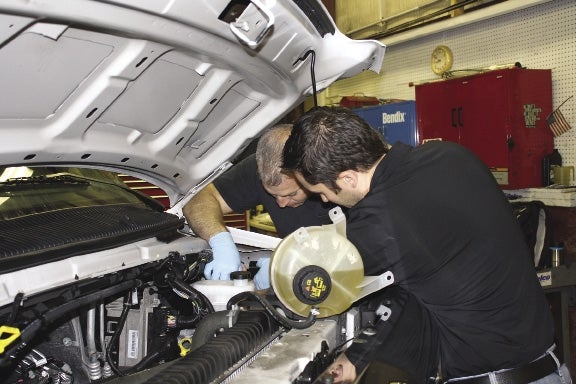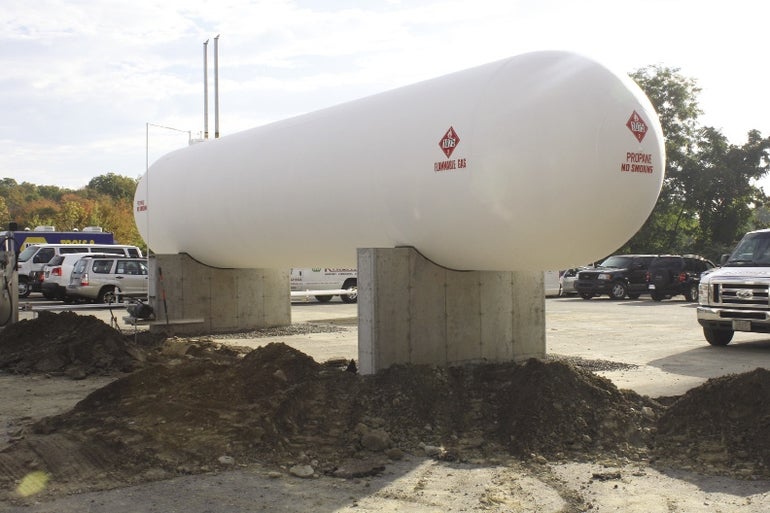Change In State Regs Opens Door To More Propane-Powered Vehicle Fleets
With passenger vehicles leaving Logan International Airport every 20 minutes on weekdays, the cost of fuel for Knight's Airport Limousine in Shrewsbury adds up quickly. Owner Michael Hogan said the business spent $1.1 million on gasoline in 2012 and was on track to spend about the same this year.
But a change in the state regulations, which Hogan pursued on his company's behalf over the last three years, will slash what he spends on fuel for his fleet of passenger vans, town cars and mini-buses, which log between 500 and 600 miles on a typical day.
“Once the gas started approaching three bucks a gallon, we started looking at alternatives for fuel,” Hogan said. The search led him to Roush CleanTech, a division of Michigan-based Roush Enterprises that designs and installs propane fuel systems for vehicles.
Knight’s Worked With State
With help from state Sen. Michael Moore, D-Millbury, and working in conjunction with the Clean Cities Coalition, a U.S. Department of Energy Program tasked with reducing the reliance on petroleum for fuel, Knight's convinced the Massachusetts Department of Transportation (MassDOT) to allow vehicles powered by propane tanks to travel through the state-owned tunnels in Boston, especially the ones that connect Logan airport with the rest of the commonwealth and that carry Knight's vehicles daily.
Prior to the change, propane tanks could not be transported in Boston tunnels because propane, being a flammable gas, was viewed as hazardous. But according to Moore, state vehicles fueled by propane were already running through the tunnels, and technological advances have reduced the hazard risk greatly since the original regulation was written in the 1930s. After MassDOT examined the facts and held public hearings, a process that unfolded between 2010 and 2013, the regulation change was granted in March. Hogan than received the requisite permits to install an 18,000-gallon propane tank and pump behind the Knight's offices and garage on Hartford Turnpike in Shrewsbury, and is now in the process of converting eight of his vehicles to propane.
Since his vehicles have a shelf-life of about five years, Hogan plans to purchase all propane-fueled vehicles moving forward, eventually eliminating the use of gasoline. He estimated he'll save between $600,000 and $700,000 annually in fuel costs given greater efficiency and lower prices, not to mention the reduction of carbon emissions. Propane, designated by the federal government as an approved clean fuel, is among the cleanest fossil fuels.
Hogan's investment is sizeable. He paid $110,000 for the propane tank and each vehicle conversion kit costs $10,000. But he expects to make that money back in about six months, and he's pursuing grants that will reimburse him for part of the investment.
Pursuing the Massachusetts regulation change was Hogan's first political endeavor, and he said it wasn't for the faint of heart. But he's glad he put forth the effort, from an environmental as well as budget perspective.
Moore: Companies Can Reinvest Through Savings
Moore, the senator from Millbury, said Hogan's efforts have implications for businesses across Massachusetts. He hopes more businesses with large fleets will make the same decision now that propane-powered vehicles don't face the same travel restrictions in Boston. He said the investment creates a ripple effect for businesses through the money they save.
“That's more money a small business can reinvest back into the company, whether it's hiring more people or it's supplying more vehicles,” Moore said.
One indication that more companies will follow Knight's lead is the number of conversations Roush said it's having with other Massachusetts businesses and government agencies about purchasing propane fuel systems for vehicles.
Todd Mouw, vice president of sales and marketing for Roush CleanTech, said he couldn't disclose the names of potential new clients, but the interest has definitely piqued.
“We do have lots of folks that have raised their hands,” Mouw said.
Roush now has about 300 clients and roughly 7,000 propane fuel units on U.S. roads, according to Mouw. And he doesn't think interest will wane in the foreseeable future.
“The main driver is (that) today you're going to be paying well under $2 a gallon for (liquefied) propane” Mouw said, noting that savings is particularly attractive for government entities like school districts that provide busing services. “It's a huge win for all.”
Steve Russell, who runs the Clean Cities program in Massachusetts, agreed. And he said that now that propane fuel technology has come to fruition, with Roush being the industry leader, more companies are starting to take note.
“All of the sudden fleets are starting to say, 'This is a good deal',” Russell said.











0 Comments